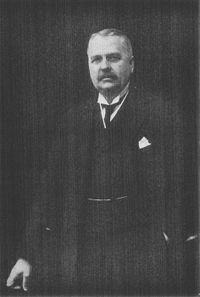
Andrew Weir, 1st Baron Inverforth
Encyclopedia

Privy Council of the United Kingdom
Her Majesty's Most Honourable Privy Council, usually known simply as the Privy Council, is a formal body of advisers to the Sovereign in the United Kingdom...
(24 April 1865–17 September 1955) created and headed the firm of Andrew Weir and Co. shipowners of Glasgow
Glasgow
Glasgow is the largest city in Scotland and third most populous in the United Kingdom. The city is situated on the River Clyde in the country's west central lowlands...
. In the First World War he served as a minister in the coalition government
Coalition Government 1916-1922
The Coalition Government of David Lloyd George came to power in the United Kingdom in December 1916, replacing the earlier wartime coalition under H.H. Asquith, which had been held responsible for reverses during the Great War. Those Liberals who continued to support Asquith served as the Opposition...
: he was Surveyor General of Supplies from 1917–1919, and Minister of Munitions
Minister of Munitions
The Minister of Munitions was a British government position created during the First World War to oversee and co-ordinate the production and distribution of munitions for the war effort...
from 1919–1921, .
Andrew Weir was born in Kirkcaldy, Fife the eldest son of William Weir and his wife, Janet. Both William Weir and his father were cork merchants. After attending the high school at Kirkcaldy, Andrew went to work for the Commercial Bank of Scotland
Commercial Bank of Scotland
The Commercial Bank of Scotland Ltd. was a Scottish commercial bank. It was founded in Edinburgh in 1810, and obtained a royal charter in 1831. It grew substantially through the 19th and early 20th centuries, until 1959, when it merged with the National Bank of Scotland to become the National...
. He soon moved to Glasgow
Glasgow
Glasgow is the largest city in Scotland and third most populous in the United Kingdom. The city is situated on the River Clyde in the country's west central lowlands...
. Shortly after his twentieth birthday, he bought a sailing ship, the barque Willowbank, which he employed in the coasting trade. The next year Weir began building sailing ships of modern design and within a few years had built up a fleet of fifty-two. In 1896 Weir moved to London and started converting his fleet from sail to steam.
During the First World War in March 1917 Weir was asked to report on the commercial organization of the supply branches of the army. Weir recommended the appointment of a surveyor-general of supply, with a seat on the army council, to take over the task of supplying the army with all its stores and equipment other than munitions. His recommendations were accepted and he was given the job.
In January 1919 after the war had ended he was appointed Minister of Munitions
Minister of Munitions
The Minister of Munitions was a British government position created during the First World War to oversee and co-ordinate the production and distribution of munitions for the war effort...
to close down the supply operation and dispose of unwanted materiel. He remained in office until March 1921. For his services Weir was raised to the peerage Baron Inverforth, of Southgate in the County of Middlesex, and received the American Distinguished Service Medal
Distinguished Service Medal (United States)
The Distinguished Service Medal is the highest non-valorous military and civilian decoration of the United States military which is issued for exceptionally meritorious service to the government of the United States in either a senior government service position or as a senior officer of the United...
.
After the war Lord Inverforth invested in diesel powered ships. He also broadened his business interests becoming involved in the Marconi group of companies. He was also chairman of the Anglo-Burma Burma Rice Company and of the Wilmer Grain Company, and was also on the board of Lloyds Bank
Lloyds Bank
Lloyds Bank Plc was a British retail bank which operated in England and Wales from 1765 until its merger into Lloyds TSB in 1995; it remains a registered company but is currently dormant. It expanded during the nineteenth and twentieth centuries and took over a number of smaller banking companies...
.
Inverforth continued to go to the office four days a week, into his ninety-first year. He died at his home in Hampstead
Hampstead
Hampstead is an area of London, England, north-west of Charing Cross. Part of the London Borough of Camden in Inner London, it is known for its intellectual, liberal, artistic, musical and literary associations and for Hampstead Heath, a large, hilly expanse of parkland...
on 17 September 1955.
Biography
- G. K. S. Hamilton-Edwards, ‘Weir, Andrew, first Baron Inverforth (1865–1955)’, rev., Oxford Dictionary of National Biography, Oxford University Press, 2004.
External links
Inverforth's Hampstead house and its garden (Hill Garden) are described in

